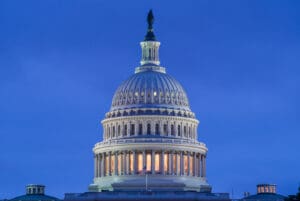The economic crisis caused by the coronavirus pandemic poses a triple challenge for tax policy in the United States. Lawmakers are tasked with crafting a policy response that will accelerate the economic recovery, reduce the mounting deficit, and protect the most vulnerable.
To assist lawmakers in navigating the challenge, and to help the American public understand the tax changes being proposed, the Tax Foundation’s Center for Federal Tax Policy modeled how 70 potential changes to the tax code would affect the U.S. economy, distribution of the tax burden, and federal revenue.
In tax policy there is an ever-present trade-off among how much revenue a tax will raise, who bears the burden of a tax, and what impact a tax will have on economic growth. Armed with the information in our new book, Options for Reforming America’s Tax Code 2.0, policymakers can debate the relative merits and trade-offs of each option to improve the tax code in a post-pandemic world.

Florida’s Property Tax Reform Push: Weighing the Options Amidst a Lack of Consensus on the State Budget
Florida’s latest property tax debate highlights the familiar challenge of prioritizing pro-growth tax policy while tackling rising property tax burdens.
6 min read
Fixing Highway Funding in the Reconciliation Package
The EV fee in the reconciliation package would help the fiscal situation but would overcorrect the hole in the gas tax base EVs create. There are intermediate options, such as VMT taxes for EVs and commercial traffic or pairing flat EV fees with gas and diesel tax increases, that would be incrementally better than the reconciliation package’s approach.
7 min read
SALT Cap Workarounds for Some Pass-Through Entities Are Threatened by One, Big, Beautiful Bill
For owners of pass-through businesses, the reconciliation package (1) raises the state and local tax (SALT) deduction cap, (2) denies the benefit of pass-through entity-level taxes that had previously worked around the SALT cap for such pass-through businesses, and (3) increases the Section 199A deduction for qualifying pass-through entities.
4 min read
State Implications of the One, Big, Beautiful Bill
As the US House hashes out its “One, Big, Beautiful Bill,” statehouse lawmakers are watching closely, given the impact of both its tax and spending provisions on state budgets.
12 min read
What Are the Goals of Retaliatory Tax Policies?
The US Ways and Means Committee’s “Big Beautiful Bill” includes a retaliatory provision called Section 899, along with an expansion of the base erosion and anti-abuse tax (BEAT).
7 min read
Fiscal Forum: Future of the EU Tax Mix with Dr. Jost Heckemeyer
Sean Bray interviewed Professor of Business Accounting and Taxation at the University of Kiel, Jost Heckemeyer, about the future of the EU tax mix. The interview shows that there is a trade-off between stability and flexibility in European tax policymaking. It also shows that there ought to be a balance between fairness and competitiveness when thinking about improving tax policy.
16 min read
A More Generous SALT Deduction Cap in the Big, Beautiful Bill Would Cost Revenue and Primarily Benefit High Earners
Letting the SALT cap slip further upwards would undercut the TCJA’s long-term legacy, worsening the fiscal outlook of the tax package and providing an unneeded benefit to higher earners.
4 min read
Current Trump Tariffs Threaten to Offset Benefits of Promised Tax Cuts
While Congress works on the “One, Big, Beautiful Bill” to cut taxes, President Trump has imposed significantly higher taxes by placing tariffs on more than 70 percent of US imports.
2 min read
An Income Tax by Any Other Name: State-Level Non-UI Payroll Taxes
Six states and DC assess a state-level non-UI payroll tax in addition to their mandatory federal UI payroll tax.
6 min read
Montana Property Tax Reform Options: A Tax Shift Is Not a Tax Reform
With such important changes to Montana’s property tax system at stake, it’s important that lawmakers get the details right.
5 min read